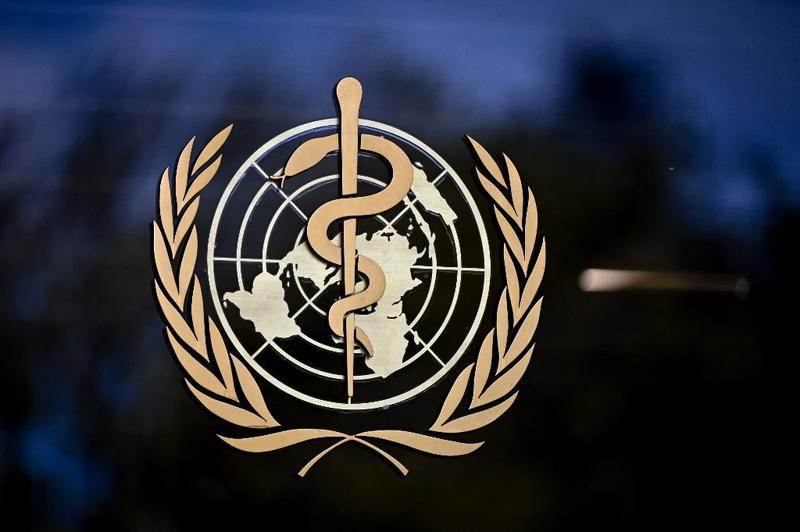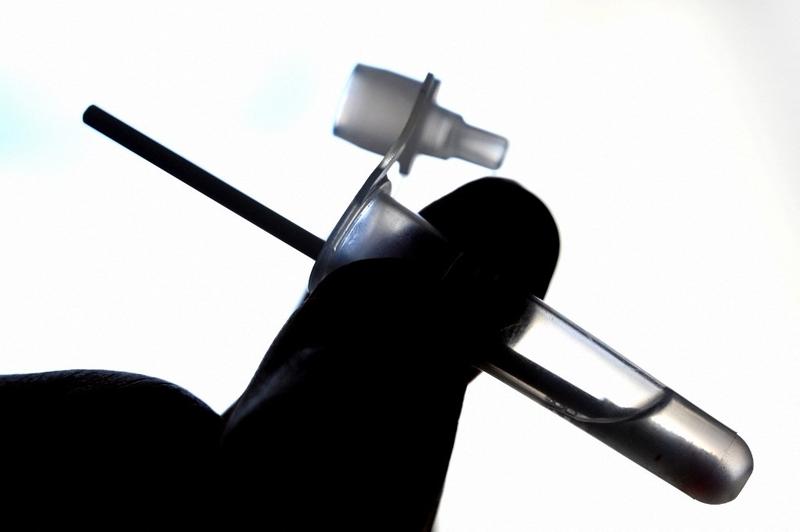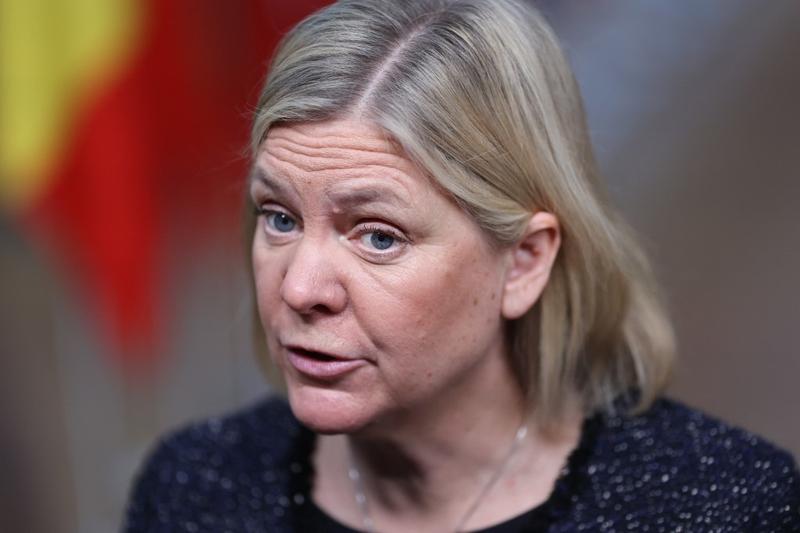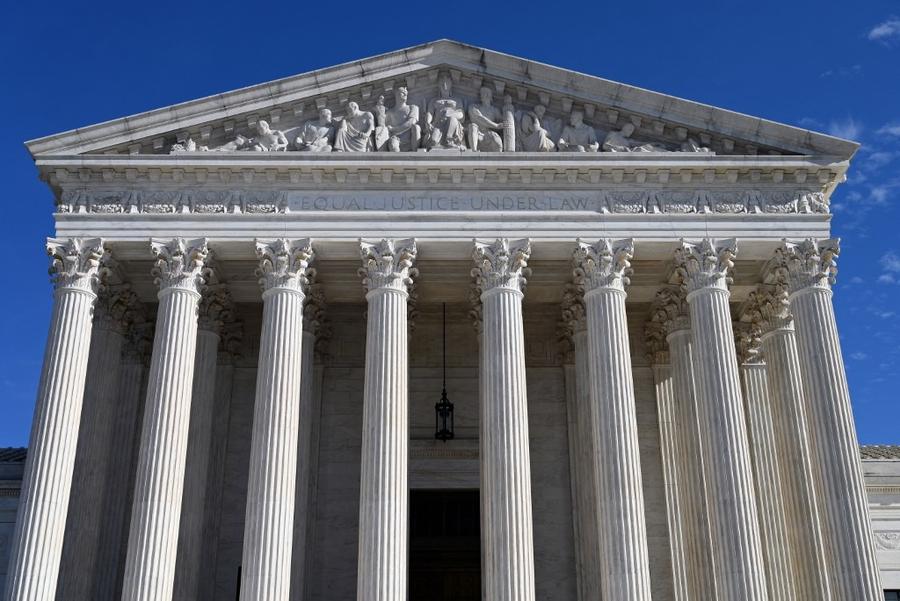 A picture taken on May 8, 2021 shows a sign of the World Health Organization at the entrance of their headquarters in Geneva amid the COVID-19 coronavirus outbreak. (FABRICE COFFRINI / AFP)
A picture taken on May 8, 2021 shows a sign of the World Health Organization at the entrance of their headquarters in Geneva amid the COVID-19 coronavirus outbreak. (FABRICE COFFRINI / AFP)
WASHINGTON / PARIS / BURLIN / MADRID / HAVANA / MOSCOW / BUDAPEST / STOCKHOLM / ROME - A World Health Organization panel recommended use of two drugs by Eli Lilly, and GlaxoSmithKline and Vir Biotechnology for COVID-19 patients, adding treatment options as the fast-spreading Omicron variant renders many ineffective.
WHO data shows Omicron, which is evading protection provided by many vaccines and therapies, has been identified in 149 countries. It is quickly replacing Delta as the dominant variant in several nations, forcing governments and scientists to bolster defenses with testing, shots and therapies.
The panel on Thursday strongly recommended Lilly's baricitinib, sold under brand name Olumiant, for patients with severe COVID-19 in combination with corticosteroids, while conditionally endorsed GSK-Vir's antibody therapy for non-severe patients at the highest risk of hospitalization
The panel on Thursday strongly recommended Lilly's baricitinib, sold under brand name Olumiant, for patients with severe COVID-19 in combination with corticosteroids, while conditionally endorsed GSK-Vir's antibody therapy for non-severe patients at the highest risk of hospitalization.
So far, GSK-Vir's monoclonal antibody therapy is the only one that has shown effectiveness against Omicron in lab tests, while similar treatments from Eli Lilly and Co and Regeneron Pharmaceuticals offered lower protection in such tests.
The WHO experts noted that the effectiveness of monoclonal antibody treatments - lab-generated compounds that mimic the body's natural defenses - against new variants such as Omicron was still uncertain, and said the guidelines for this class of medicine will be updated when additional data become available.
The WHO guidelines, published in the British Medical Journal, also noted that evidence shows baricitinib improves survival rate and reduces the need for ventilation, with no observed increase in adverse effects.
French medical charity Medecins Sans Frontieres welcomed the United Nations agency's guidelines, and said baricitinib can be a potential alternative to current WHO-recommended monoclonal antibody treatments that remain in short supply for governments and patients in many low- and middle-income countries.
MSF also said that governments must take steps to ensure that patent monopolies do not stand in the way of access to the treatment.
Canada
The Canadian province of Quebec is pressing ahead with a plan to levy a "health contribution" on adults refusing to get COVID-19 inoculations and will unveil details soon, premier Francois Legault said on Thursday.
Legault unveiled the proposal on Tuesday, sparking a nationwide debate about how far governments could go to ensure widespread vaccinations as the Omicron variant spreads.
Ontario, the most populous of the 10 provinces, rejected the idea on the grounds it was punitive.
A bill will be presented to the Quebec legislature for a debate early next month, Legault told reporters, dismissing opposition accusations that it would unfairly target the homeless, sick people and the mentally ill.
"There is no question of harming people who are in trouble. Our aim is to tell people who choose not to get vaccinated that there will be a price to pay because there will be an impact on society and how much our healthcare system costs," he said.
Quebec says the contribution would be at least C$100 ($80). The idea may be lawful but could go against the spirit of Canada's universal public health system, rights and medical experts say.
Cuba
Cuba on Thursday said it exceeded 3,000 daily COVID-19 infections, registering 3,387 cases in 24 hours, bringing the tally to 988,789 cases.
According to the Ministry of Public Health, one more COVID-19 death in the same 24-hour period raised the death toll to 8,331.
 Teachers and schools personnel gather during a demonstration called by teachers' unions to denounce "an indescribable mess" because of the new government's measures against COVID-19 in Marseille, southern France on Jan 13, 2022. (CLEMENT MAHOUDEAU / AFP)
Teachers and schools personnel gather during a demonstration called by teachers' unions to denounce "an indescribable mess" because of the new government's measures against COVID-19 in Marseille, southern France on Jan 13, 2022. (CLEMENT MAHOUDEAU / AFP)
France
Tens of thousands of French teachers angry with the government's COVID-19 rules walked off the job on Thursday and took to the streets to demand better protection for pupils and staff against infection.
"Stop your contempt," and "We're fed up with tests" teachers proclaimed on banners in rallies across France, calling for the government to provide them with FFP2 face-masks and to stop changing the rules so often.
Teachers, parents and school directors have struggled to cope with the many twists and turns in COVID-19 rules on schools. New testing requirements announced a day before schools restarted after the Christmas holidays and changed twice since increased the anger.
"We had reached such a level of exasperation, tiredness, and anger that we didn't have any other option but to organize a strike to send a strong message to the government," said union leader Elisabeth Allain-Moreno.
Many at the rallies called for the resignation of Education Minister Jean-Michel Blanquer. A government source said he was unlikely to lose his job so close to April's presidential election.
Prime Minister Jean Castex will, however, meet teachers' representatives later on Thursday, his office said, in a sign the government was keen to try and quell their anger.
The government has so far stood by its policy to keep classes open and requiring all pupils in contact with an infected person to get tested three times. Some degree of complication is the price to pay to keep schools open, it said.
Infections have surged in schools as France has set records with close to 370,000 new daily cases, sending families scrambling to get their children tested.
Unions said 75 percent of teachers in primary schools and 62 percent in high schools walked out, while the Education Ministry said less than half those numbers did. Strike turnout was unusually high in either case.
Some schools closed due to the strike, others were open only for children of health workers while some operated as normal.
French Minister of Health Olivier Veran announced on Thursday he had tested positive for COVID-19
Meanwhile, French Minister of Health Olivier Veran announced on Thursday he had tested positive for COVID-19.
The health minister had taken both a self-test and an antigen test, after presenting mild symptoms. On Wednesday, he was alerted by the French phone application TousAntiCOVID (Everyone Against COVID-19) that he had had contact with a positive case.
On his social media account, Veran said that he would go into self-isolation and continue working remotely.
Also on Thursday, the French Ministry of Health announced that at least 600,000 people will lose their health passes on Jan 15 as they have not received their booster shot.
Germany
Germany's vaccine committee recommended on Thursday that all children between the ages of 12 and 17 receive a COVID-19 booster shot as the country reported a new daily record of more than 81,000 coronavirus infections.
The government's coronavirus crisis manager warned of possible bottlenecks in testing, though Health Minister Karl Lauterbach said Germany had the means to handle the situation.
The move on booster shots makes Germany among the first countries in the world to make such a recommendation, following the United States, Israel and Hungary.
Hungary
To keep the fifth COVID-19 wave under control, Hungary's government would offer a fourth dose of the COVID-19 vaccine to the country's citizens on a voluntary basis, a senior official said here on Thursday.
"Those who want to will be able to receive the fourth jab after consulting with a doctor," Gergely Gulyas, Prime Minister Viktor Orban's chief of staff, told journalists, adding that the government will soon publish the relevant decree.
The move was made necessary by the fast-spreading Omicron coronavirus variant.
"Most infections are now caused by the Omicron variant, but the government expects the number of people needing hospital care not to rise as fast as the number of infected," Gulyas said.
The government also decided to modify its official pass, called "protection certificate" in Hungarian, which will from Feb. 15 be called "vaccination certificate."
The card will only be issued to those who have received three vaccine doses or at least a second jab in the past six months.
Italy
Italian police have protested to the interior ministry after being sent pink health masks to wear on duty, saying the colour risked damaging their reputation.
"We do not understand the reason behind the purchase of masks in a colour that would appear at first sight to be unsuitable for our administration," the police union wrote in a letter to the interior ministry.
"This purchase is puzzling," the letter said, adding that two years into the COVID-19 health crisis it should be easy to purchase appropriate face masks.
In future, masks should only be black, white or blue, they said.
There was no immediate comment from the interior ministry.
Russia
Russia registered 21,155 new coronavirus cases in the past 24 hours, taking the nationwide tally to 10,723,305, the official monitoring and response center said Thursday.
The nationwide death toll grew by 740 to 319,172, while the number of recoveries from the disease increased by 25,984 to 9,784,348.
Meanwhile, Moscow, Russia's worst-hit region, reported 5,490 new cases, taking its total caseload to 2,069,957. The Russian capital was followed by Saint Petersburg with 1,839 new cases.
 A person runs a COVID-19 antigen self-test on Jan 13, 2022 in Madrid. (GABRIEL BOUYS / AFP)
A person runs a COVID-19 antigen self-test on Jan 13, 2022 in Madrid. (GABRIEL BOUYS / AFP)
Spain
Spain will cap prices for rapid coronavirus tests and open up its booster shot program to everyone over the age of 18, the government said on Thursday, as infections continued to rise albeit at a slightly slower pace.
Health Minister Carolina Darias said that from Saturday antigen tests would be sold to the public for a maximum of 2.94 euros ($3.37), bringing prices closer in line with other European countries.
"Our objective was first to stabilize the supply after demand increased by a factor of over 1,000 - and then we focused on regulating prices," Darias told reporters.
Spain had sporadic shortages of antigen tests throughout December amid a sudden spike in demand because of Omicron's high transmissibility and people wanting to get tests during the year-end festivities.
Antigen tests are currently only available for sale in pharmacies in Spain, despite calls from supermarket lobby groups and some health experts to allow their sale in supermarkets, as neighboring Portugal has done.
 Sweden's Prime Minister Magdalena Andersson arrives for an European Union Summit with all 27 EU leaders at The European Council Building in Brussels on Dec 16, 2021. (KENZO TRIBOUILLARD / POOL / AFP)
Sweden's Prime Minister Magdalena Andersson arrives for an European Union Summit with all 27 EU leaders at The European Council Building in Brussels on Dec 16, 2021. (KENZO TRIBOUILLARD / POOL / AFP)
Sweden
Swedish Social Democratic Prime Minister Magdalena Andersson has tested positive for COVID-19, her spokesperson said on Friday, as a growing wave of infections swept the country driven by the more contagious Omicron variant.
Andersson, 54, is one of several party leaders to have tested positive for the virus in the wake of a debate in parliament earlier this week while Sweden's king, queen and crown princess have all been hit with infections this month.
 This file photo taken on Dec 04, 2021 shows the US Supreme Court in Washington DC. (DANIEL SLIM / AFP)
This file photo taken on Dec 04, 2021 shows the US Supreme Court in Washington DC. (DANIEL SLIM / AFP)
US
The US Supreme Court on Thursday blocked US President Joe Biden's COVID-19 vaccination-or-testing mandate for large businesses - a policy the conservative justices deemed an improper imposition on the lives and health of many Americans - while endorsing a separate federal vaccine requirement for healthcare facilities.
Biden voiced disappointment with the conservative-majority court's decision to halt his administration's rule requiring vaccines or weekly COVID-19 tests for employees at businesses with at least 100 employees. Biden said it now is up to states and employers to decide whether to require workers "to take the simple and effective step of getting vaccinated."
The court was divided in both cases, centering on pandemic-related federal regulations at a time of escalating coronavirus infections driven by the Omicron variant in a nation that leads the world with more than 845,000 COVID-19 deaths.
It ruled 6-3, with the six conservative justices in the majority and three liberal justices dissenting, in blocking the rule involving large businesses - a policy that applied to more than 80 million employees. The court's majority downplayed the risk COVID-19 specifically poses in the workplace, comparing it instead to "day-to-day" crime and pollution hazards that individuals face everywhere.
The vote was 5-4 to allow the healthcare worker rule, which requires vaccination for about 10.3 million workers at 76,000 healthcare facilities including hospitals and nursing homes that accept money from the Medicare and Medicaid government health insurance programs for elderly, disabled and low-income Americans. Two conservatives, Chief Justice John Roberts and Justice Brett Kavanaugh, joined the liberals in the majority in that case.
In a statement, Biden said the court's decision allowing the healthcare worker mandate "will save lives" and his administration will enforce it. Workers must be vaccinated by the end of February.
The court heard arguments last Friday in the legal fight over temporary mandates issued in November by two federal agencies aimed at increasing US vaccination rates and making workplaces and healthcare settings safer. The cases tested presidential powers to address a swelling public health crisis.
In an unsigned ruling, the court said the rule affecting large businesses, issued by the Occupational Safety and Health Administration, was not an ordinary use of federal power.
"It is instead a significant encroachment on the lives - and health - of a vast number of employees," the court said.
"Permitting OSHA to regulate the hazards of daily life -simply because most Americans have jobs and face those same risks while on the clock - would significantly expand OSHA's regulatory authority without clear congressional authorization," the court added.
Challengers led by the state of Ohio and the National Federation of Independent Business, which represents employers, asked the justices to block OSHA's rule after a lower court lifted an injunction against it. Companies were supposed to start showing they were in compliance starting this past Monday.
In dissent, Justice Stephen Breyer wrote on behalf of the liberal justices that the decision "stymies the federal government's ability to counter the unparalleled threat that COVID-19 poses to our nation's workers."
"Today's decision is welcome relief for America's small businesses, who are still trying to get their business back on track since the beginning of the pandemic," said Karen Harned, executive director of the NFIB's legal arm.


